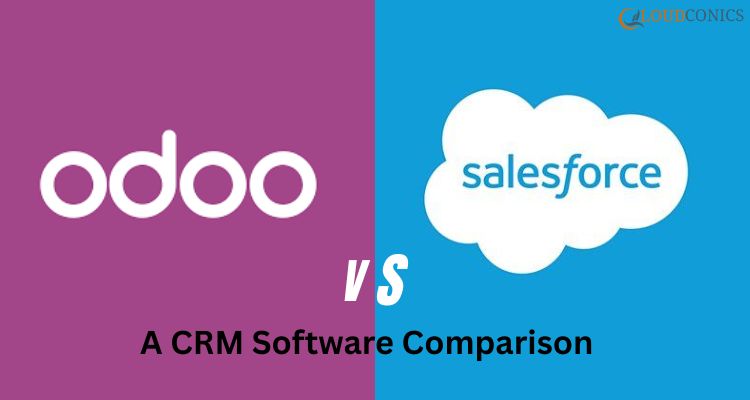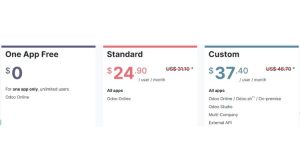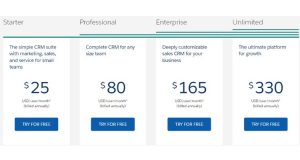
 January 20, 2026
January 20, 2026
Odoo vs Salesforce: Which CRM & ERP Platform Should You Choose?
Introduction
The decision to implement a new business platform—whether it’s for CRM, ERP, or both—is one of the most strategic choices a company can make. The right system can boost sales, simplify operations, and improve customer experiences. The wrong one can slow you down, cost you more than expected, and create data silos.
Odoo and Salesforce are two of the most powerful names in this arena, yet they serve very different purposes. If you’re wondering which one is best for your business, this guide is for you.
- Salesforce is the industry leader in CRM software, known for its rich features, scalability, and AI-driven sales intelligence.
- Odoo is a full-fledged ERP and CRM suite designed for businesses seeking a unified solution across all departments—from sales to finance to HR.
As a trusted Odoo Learning Partner, CloudConics has worked with businesses of all sizes to help them make the right choice based on growth stage, technical needs, and budget. In this blog, we’ll explore how both platforms stack up and help you choose what fits best.
Quick Stats & Facts
Before diving into a head-to-head comparison, here are some fast facts to understand the scale and scope of each platform:
- Salesforce operates in 89 cities worldwide, with over 110 offices, and generated $14.74 billion from the American market alone in 2021—roughly 69.34% of its global revenue.
- Odoo boasts a community of 1500+ developers who’ve contributed to more than 16,000 apps, enabling companies to expand functionality without high development costs.
- Odoo holds a significant 15.51% market share in the ERP segment, and it’s growing rapidly in developing and mid-size markets.
- The global ERP software market is booming, expected to grow from $167.33 billion in 2022 to $187.88 billion in 2023 at a CAGR of 12.3%.
This tells us one thing clearly: both tools are major players, but they serve different priorities.
CRM Overview: Odoo vs Salesforce
A Customer Relationship Management (CRM) system is the heartbeat of any growth-focused business. It helps companies track leads, manage customer interactions, and close deals faster. Both Odoo and Salesforce offer robust CRM capabilities, but their approach, architecture, and focus differ significantly.
Odoo CRM: Simplicity Meets Integration
Odoo CRM is not a standalone tool—it’s a tightly integrated part of Odoo’s larger ERP ecosystem. This means sales teams can easily collaborate with finance, operations, and customer support, all from one platform.
🔹 Key Features of Odoo CRM:
- Visual sales pipelines with drag-and-drop ease
- Real-time activity tracking, automated follow-ups, and lead scoring
- Built-in email marketing and SMS integration
- Direct connection with Odoo Invoicing, Inventory, Accounting, and Helpdesk
- Mobile-friendly and available in both cloud and on-premise versions
“Odoo CRM isn’t just a sales tool. It’s a unified space where your entire business can align behind the customer.”
Because of its modular nature, businesses can start small (with CRM) and scale gradually to include other apps like HR, Project, and Manufacturing—all without switching platforms. Through expert Odoo Customization, workflows and UI can be tailored exactly to your business.
This is especially valuable for companies seeking cost-effective ERP-CRM integration. That’s why CloudConics, as the Best Odoo Partner in India, helps clients unlock full-suite functionality with minimal technical friction.
Salesforce CRM: Powerhouse for Enterprise Sales
Salesforce CRM is the global leader in customer relationship technology. It’s built to support complex sales processes, cross-functional customer data, and AI-powered automation.
🔹 Key Features of Salesforce CRM:
- Lead and opportunity tracking with territory management
- Einstein AI for predictive insights and auto-generated recommendations
- Omnichannel support: email, phone, chat, and social
- Deep integration with marketing, service, and commerce clouds
- Custom dashboards and reports for every user role
Salesforce is trusted by enterprise giants for its scalability and intelligence layer. However, it often requires a dedicated admin or partner to configure workflows, dashboards, and automations correctly. That’s why businesses often choose to Hire the Right Salesforce Implementation Consultant to ensure a smooth, high-impact setup.
“Salesforce doesn’t just track leads—it learns from them.”
Benefits of Using CRM Software
Whether you choose Odoo or Salesforce, implementing a CRM offers tangible value across departments. Here’s how:
1. Centralized Customer Data
CRM software creates a single source of truth for all customer data—from first contact to post-sale support. Sales reps can access everything they need in one place: emails, call logs, meeting notes, deal status, and more.
2. Automation That Saves Time
With features like automated follow-ups, lead scoring, and rule-based task assignments, CRM software reduces manual work and increases sales efficiency. For example, a lead that opens an email can automatically be moved to the next sales stage in Odoo or Salesforce.
3. Improved Collaboration Across Teams
Sales, marketing, and support teams can collaborate on the same customer timeline. No more guessing who last spoke to a client or what was discussed.
4. Smarter Decision-Making
CRM platforms offer detailed analytics and custom reports. Salesforce shines here with Einstein AI, while Odoo’s modular reporting tools allow businesses to track KPIs across apps, from sales revenue to customer service satisfaction.
5. Higher Conversion Rates
According to Nucleus Research, CRM improves sales productivity by 14.6%. With the right workflows in place, businesses can nurture leads faster and close more deals.
At CloudConics, we’ve helped businesses combine CRM with marketing, accounting, and inventory through expert Odoo ERP Customization—delivering seamless experiences that sales teams love and customers appreciate.
Odoo vs Salesforce: Key Distinctions
Background
Understanding the roots of each platform reveals why they’ve evolved so differently—and why your choice depends on more than just price or brand.
Odoo Background
- Founded in Belgium in 2005 as “TinyERP”, Odoo was built from the start as an open-source, modular business suite.
- Its goal? To create an ERP system that’s flexible, user-friendly, and affordable—even for small and mid-sized businesses.
- Today, Odoo supports over 16,000+ apps, covering everything from CRM and HR to Manufacturing, Inventory, and eCommerce.
- It is especially popular among businesses seeking complete control over their tech stack.
- With proper Odoo Customization, companies tailor each app exactly to their workflow.
“We chose Odoo because it gave us CRM and ERP in one dashboard—without paying for multiple tools.” — Logistics client, CloudConics
As an Odoo Learning Partner, CloudConics enables clients to scale from CRM-only usage to full ERP coverage over time.
Salesforce Background
- Salesforce was founded in 1999 in San Francisco and is widely recognized as the pioneer of cloud-based CRM software.
- Originally focused on sales and contact management, it has grown into a CRM powerhouse—with additional clouds for marketing, customer service, commerce, and analytics.
- With acquisitions like Slack, Tableau, and MuleSoft, Salesforce is now more than just a CRM—it’s an enterprise platform ecosystem.
“Salesforce gives us intelligence we didn’t know we needed—until it became indispensable.” — VP of Sales, SaaS startup
However, Salesforce is CRM-first—you’ll need third-party tools or integrations for ERP-level functionality like accounting or HR.
Features Comparison
Here’s how the platforms stack up feature by feature.
Odoo Features
- Modular System: Install only what you need—CRM, HR, eCommerce, MRP, Accounting, and more
- Unified Database: All apps (including CRM) share the same backend
- Sales Pipelines: Visual kanban-style CRM pipeline with drag-and-drop ease
- Marketing Tools: Basic email campaigns and lead automation
- Built-in eCommerce: Sell online, manage inventory, and generate invoices all from one place
- Strong ERP Depth: Track purchase orders, stock, payroll, and invoices directly inside Odoo
- Endless flexibility through Odoo ERP Customization
Think of Odoo like a “Lego” business system—you only build what you need, when you need it.
Salesforce Features
- World-Class CRM: Lead tracking, sales forecasting, automation workflows
- Einstein AI: Intelligent scoring, next-step recommendations, and smart follow-ups
- Omnichannel Support: Manage contacts via email, phone, web, chat, and social
- Marketing Cloud: Advanced segmentation, journey builder, and campaign tracking
- AppExchange Ecosystem: 3,000+ apps for everything from finance to analytics
- Highly Customizable: But often needs a certified consultant to build flows and integrations
Salesforce is like a Formula 1 car—amazing performance, but you’ll need an expert driver to unleash its power.
Limitations
Let’s be real—no system is perfect. Here’s what businesses often find challenging:
Odoo Limitations
- Limited AI capabilities (compared to Salesforce)
- Quality of community modules can vary—always best to work with a vetted Best Odoo Partner in India. How to Choose the Right Odoo Partner? READ OUR BLOG ON THIS
- For large-scale email marketing or enterprise-grade marketing automation, it requires add-ons
- Customizations require technical know-how or an implementation partner
That’s why businesses often seek the Best Odoo Implementation Services to ensure smooth setup.
Salesforce Limitations
- High cost of licensing and implementation—especially when multiple clouds are used
- Steep learning curve for admins and non-technical users
- No built-in ERP modules like Accounting, Inventory, or HR—you’ll need integrations
- Smaller teams often find it overkill for their actual requirements
These factors are why many companies ask: Why Users Are Switching to Zoho from Salesforce? We have another comparison
Pricing Comparison
Odoo Pricing

Odoo includes every app with its entire range of features and integrations in the Standard version. Source from odoo.com.
- ✅ Free Community Version
- 100% free forever
- Great for small teams needing basic CRM, Sales, and Inventory
- 100% free forever
- ✅ Odoo Online (Cloud-hosted)
- ~$24/user/month for one app
- ~$37.40/user/month for full access to 50+ apps
- Pay-as-you-grow pricing model
- ~$24/user/month for one app
- ✅ Enterprise Edition (Self-hosted)
- Custom pricing depending on user count and apps selected
- Full control, including access to the codebase for advanced customization
- Custom pricing depending on user count and apps selected
Odoo provides affordable, full-suite functionality, making it a popular choice for SMEs scaling operations.
Salesforce Pricing

Salesforce’s Sales Cloud application, which is a direct comparison to Odoo’s CRM and Sales applications, is available in 4 editions: Starter, Professional, Enterprise, and Unlimited. Source from odoo.com.
- Essentials Plan: $25/user/month — for small teams
- Professional Plan: $80/user/month — includes automation
- Enterprise Plan: $165/user/month — custom objects, API access, advanced automation
- Add-ons like Marketing Cloud, Service Cloud, and CPQ cost extra
For companies using multiple Salesforce modules, costs can easily exceed thousands per month.
This is where many SMEs feel locked out—unless they choose to Hire the Right Salesforce Implementation Consultant who can help optimize feature use.
Focus
Each platform has a clear philosophy behind its design.
- Odoo focuses on being your complete business operating system—CRM, ERP, HR, eCommerce, and more—all under one roof. This saves time, money, and training effort.
- Salesforce focuses on being the most powerful CRM in the market—delivering data-driven sales, marketing, and service features for enterprise organizations.
Final Thoughts
The battle between Odoo and Salesforce isn’t about which is better—it’s about what’s better for you.
- Choose Salesforce if:
- You are a large-scale enterprise with deep sales processes
- You want to leverage AI for customer predictions and lead scoring
- You have the budget and in-house IT support (or are ready to Hire the Right Salesforce Implementation Consultant)
- You need best-in-class CRM capabilities—but not built-in ERP
- Choose Odoo if:
- You want an all-in-one platform to manage sales, finance, HR, and operations
- You’re a small or mid-sized business looking for affordable scalability
- You want custom business flows via Odoo ERP Customization
- You value flexibility, control, and long-term cost-efficiency
- You want an all-in-one platform to manage sales, finance, HR, and operations
“In today’s tech stack—less is more. That’s why many teams are replacing multiple tools with a single Odoo suite.”
Whether you’re a startup looking to scale or an established business seeking ERP + CRM synergy, Odoo offers a future-proof foundation. And if you’re only focused on advanced customer analytics and pipeline automation, Salesforce is hard to beat.
Discover the Right Software for Your Business with CloudConics
At CloudConics, we don’t just implement software—we build success stories.
As an official Odoo Learning Partner, our team helps you evaluate, implement, and optimize your platform for real-world impact.
Here’s how we help:
- Guided platform comparison: Odoo vs Salesforce vs Zoho
- Personalized solution mapping based on your team structure & workflows
- Full-suite implementation of Odoo CRM, Accounting, HR, eCommerce
- Expert Odoo Customization tailored to your unique operations
- Ongoing support, performance tracking, and upgrades
🎯 Looking for trusted partners? CloudConics is the Best Odoo Partner in India, trusted by brands across industries.
📚 Not sure where to begin?
Need help now? Book Your 30 mins call for a free consultation.
This blog was compiled by CloudConics and takes sources from many places to make it objective and fair. If you find a mistake or a missing feature, please report it to marketing@cloudconics.com and we will update this blog. Our goal is to have a continuously updated comparison of the main competitors to be as accurate as possible.



